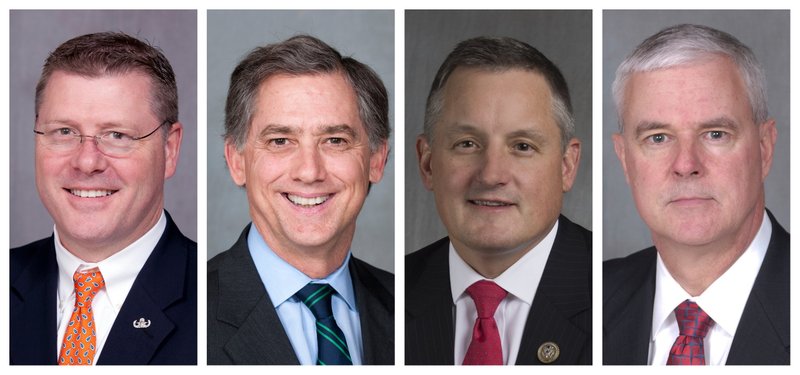WASHINGTON -- Members of Arkansas' all-Republican House delegation split Thursday over whether to support the Bipartisan Budget Act of 2019, which lifts spending $320 billion above existing law over the next two years.
U.S. Rep. Steve Womack of Rogers and U.S. Rep. French Hill of Little Rock backed the legislation.
U.S. Rep. Bruce Westerman of Hot Springs and U.S. Rep. Rick Crawford of Jonesboro opposed it.
The White House had urged passage of the bill, which enjoyed the support of Republican and Democratic leadership on Capitol Hill.
Roughly two-thirds of House Republicans rejected the measure, defying the wishes of President Donald Trump, Minority Leader Kevin McCarthy, R-Calif., and others.
Womack, the ranking Republican on the House Budget Committee, said passage of the bill would shield the military from "devastating" cuts that would otherwise be triggered by the Budget Control Act of 2011.
Lifting the debt ceiling also would avert the possibility of government shutdowns or defaults during the next two years, he added.
In an interview, Womack described the Bipartisan Budget Act as "the best available option that I have."
"No. 1, the president asked for it. He needed it," Womack said. "No. 2, I have always tried my best to give our men and women in uniform what they need... We did a lot of damage to our military during the Obama administration and we are trying to buy back America's military readiness, and that is an absolutely key driver for me. And that was center-most in this decision."
The compromise also keeps in place the Hyde Amendment, Womack said. The decades-old provision, opposed by many Democratic presidential candidates, prohibits federal funding of abortion, except when the pregnancy endangers the woman's life or is the result of rape or incest.
Moving forward, Womack said he hopes lawmakers will take steps to rein in deficit spending. This can be accomplished only if lawmakers examine mandatory spending, the largest and fastest-growing budgetary category, he added.
Like Womack, Westerman also voiced concerns about the $22 trillion national debt and a series of trillion-dollar annual deficits that are on the horizon.
In an interview, he argued that the existing budgetary process is malfunctioning.
"I've consistently voted against budgets and spending measures that are arrived at through what I call a poor process and a broken process," Westerman said.
Rather than an up-or-down vote on legislation crafted by House Speaker Nancy Pelosi, McCarthy, Senate Majority Leader Mitch McConnell, R-Ky., and Senate Minority Leader Charles Schumer, D-N.Y., Westerman said he'd like to see the entire Congress participate.
"If we're truly concerned about budgets and deficits, then we've got to follow a process where these bills are debated, where there's a chance to do amendments and where we have a lot more transparency and input into the system," he added.
Like Westerman and most of his Republican colleagues, Crawford opposed the deal.
"I have a history of voting no on budgets," he said on the eve of the vote. "We always pass these budgets, but we don't have anything fundamentally in place that binds our hands appropriately from the standpoint of congressional spending and a balanced budget amendment would do that. I would at least like to be given the opportunity to vote on a balanced budget amendment before voting on a budget."
In a written statement, Hill said he supported the bill because it "reflects many of the priorities communicated to me by central Arkansans." Those included restrictions on abortion funding, expanded health care options for veterans and additional funding for border security.
"However, following today's House vote, I wrote to the president telling him of my disappointment that this spending bill, like the many before it, continues to ignore the unimpeded growth of the largest drivers of our debt: the mandatory spending programs of Medicare, Medicaid, and Social Security," he added.
A Section on 07/26/2019

